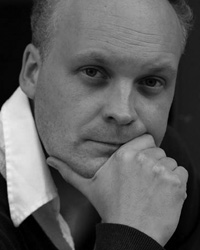|
Patrick McGuinness
(1968)
(Traducciones de Jorge Fondebrider)
Patrick McGuinness nació en Túnez en 1968, y creció en Irán, Venezuela e Inglaterra. Su primer libro de poesía, The Canals of Mars (2004), fue finalista del premio Roland Mathias. Jilted City (2010), el segundo, fue destacado como Poetry Book Society Recommendation. Traductor del francés, principalmente de Mallarmé y Hélène Dorion, publicó la novella The Last Hundred Days, que resultó finalista del Booker Prize en el Reino Unido y que ganó el Wales Book of the Year, correspondiente a 2012. Su memoir Other People’s Countries, ganó el premio Pol Roger Duff Cooper y el Wales Book of the Year Award, de 2015. Su libro más reciente es Poetry and Radical Politics in fin de siècle France (2015). Profesor de Francés y de Literatura Comparativa en Oxford vive en Caernarfon, Gales.
Secret Wars
We know the sick:
our doubles, ourselves glimpsed
as on another track.
We see their backs; staying,
they pass by. Even
here they are going,
they are already gone. We see our-
selves in them; they only
see themselves in our
unseeing eyes; they watch us
watching as the shadow
that they throw invades them.
Canals of Mars (Carcanet, 2006)
Guerras secretas
Conocemos a los enfermos:
nuestros dobles, nosotros mismos atisbados
como en otro rastro.
Vemos sus espaldas; quedándose,
pasan. Incluso
aquí están yendo,
ya se han ido. Nos vemos
en ellos; ellos solo
se ven en nuestros
ojos ciegos; nos observan
observar mientras la sombra
que ellos arrojan los invade.
Lull
Tropical and slow, the suburbs
loosen in the tilting sun:
everything is possible, has stopped,
is finished and about to happen.
Canals of Mars (Carcanet, 2006)
Tranquilidad
Tropicales y lentos, los suburbios
se aflojan en el sol que declina:
todo es posible, ha cesado,
se termina y está por pasar.
The White Place
One afternoon we watched a programme on near-death
Experiences: a woman tunnelled back through life
to what came after, and was reluctant
to return, since her life paled beside the white place
she’d been pulled back from. Now she lived between the two,
nostalgic for the afterwards she’d died into.
The next day, dozing on a stationary train
you woke and asked the question that had woken
in your mind as if it were on mine: ‘The white place’
you asked, ‘will anybody else be there?’
I didn’t know. I hadn’t though to ask – no one
had – if in the white place we’d be alone
or with other people. You asked about
your friends, if the best of here translates
to there, or if we leave, as we come in, alone.
I still don’t know. I think that we are not alone.
I think it less for your sake now than for my own.
Canals of Mars (Carcanet, 2006)
El lugar blanco
Una tarde mirábamos un programa sobre experiencias
cercanas a la muerte: una mujer que desandaba la vida por un túnel
a lo que venía después, y era reacia
a volver, ya que su vida era lívida comparada al lugar blanco
del que había sido devuelta. Ahora vivía entre los dos,
nostálgica por el después al que para entrar había muerto.
Al día siguiente, en la modorra de un tren detenido
te despertaste e hiciste la pregunta que se había despertado
en tu mente como si fuese en la mía: “¿En el lugar blanco
–preguntaste–, habrá… alguien más?”
No supe. No me pregunté –nadie lo había
hecho– si en el lugar blanco estaríamos solos
o con otra gente. Preguntaste por tus
amigos, si lo mejor de acá se traslada
allá, o si nos vamos, como llegamos, solos.
Sigo sin saberlo. Creo que no estamos solos.
Lo creo menos por ti que por mí mismo.
|



